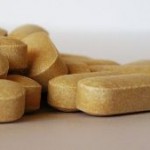As discussed in part three on prostate cancer, telomerase and telomeres are attractive targets for anticancer therapy. Tumors have relatively shorter telomeres compared to normal cell types. But, in cancer cells an enzyme called telomerase keeps rebuilding the telomeres, and the cancer cells go on dividing without control and are able to invade other tissues. Telomerase is active in most human cancers and over 90% of prostate cancers express telomerase activity. Telomerase inhibitors induce telomere shortening in cancer cells and cessation of unrestrained proliferation. Silibinin, an active constituent of milk thistle, can also inhibit the telomerase activity.
 In addition, Silibinin can also kill prostate cancer cells directly and restrict tumors’ ability to grow the new blood vessels through multiple mechanisms. It also inhibits the invasion, motility and migration of prostate cancer cells. There are four “isoforms” of silibinin (silybin A, silybin B, isosilybin A, isosilybin B), each with slightly different properties. Isoform Isosilybin B is most effective at killing cancer cells directly. Mice fed Isosilybin B were found to have much lower tumour volumes than mice treated with the other three isoforms of silibinin. Meantime, Sylibin A was found to be most effective in restricting a tumor’s ability to grow new blood vessels. Like all living tissues, tumors need a steady supply of blood to survive. New blood vessel formation, or “angiogenesis,” is critical for tumors to grow and spread.
In addition, Silibinin can also kill prostate cancer cells directly and restrict tumors’ ability to grow the new blood vessels through multiple mechanisms. It also inhibits the invasion, motility and migration of prostate cancer cells. There are four “isoforms” of silibinin (silybin A, silybin B, isosilybin A, isosilybin B), each with slightly different properties. Isoform Isosilybin B is most effective at killing cancer cells directly. Mice fed Isosilybin B were found to have much lower tumour volumes than mice treated with the other three isoforms of silibinin. Meantime, Sylibin A was found to be most effective in restricting a tumor’s ability to grow new blood vessels. Like all living tissues, tumors need a steady supply of blood to survive. New blood vessel formation, or “angiogenesis,” is critical for tumors to grow and spread.
Silibinin is not soluble in water and is uaually administered in an encapsulated form. Silibinin is absorbed when given orally. Peak plasma concentration is achieved in 6-8 hours. The oral absorbtion of silibinin is only about 20%, leading to low bioavailability of the compound; it is administered as a standard extract (30% silibinin). After oral administration the recovery in bile ranges from 2-3%. The poor solubility and bioavailability of silibinin led to the enhanced formulations. ProstaZym contains silibinin in perfectly bio-available form.
Role of E-cadherin in antimigratory and antiinvasive efficacy of silibinin in prostate cancer cells.
 Diethylstilbestrol (DES) is a powerful synthetic form of the main female sex hormone, estrogen. DES was developed to supplement a woman’s natural estrogen production. Between 1938 and 1971, millions of women in the United States were given DES to prevent them from having a miscarriage or giving birth too early. DES was used in other countries until at least the early 1980s. In 1971, researchers found that women who were exposed to DES before they were born are more likely to get a certain kind of cancer of the vagina and cervix (called clear cell adenocarcinoma, or CCA). These women are sometimes called “DES daughters.”
Diethylstilbestrol (DES) is a powerful synthetic form of the main female sex hormone, estrogen. DES was developed to supplement a woman’s natural estrogen production. Between 1938 and 1971, millions of women in the United States were given DES to prevent them from having a miscarriage or giving birth too early. DES was used in other countries until at least the early 1980s. In 1971, researchers found that women who were exposed to DES before they were born are more likely to get a certain kind of cancer of the vagina and cervix (called clear cell adenocarcinoma, or CCA). These women are sometimes called “DES daughters.”
DES is occasionally used in the treatment of advanced prostate cancer. DES may also be used, at higher doses, to treat breast cancer in post-menopausal women. It is not fully understood how it works in this situation, but it brings about a reduction in tumour size. Estrogens, including DES, are used in prostate cancer treatment to reduce androgen levels via feedback inhibition of the hypothalamic release of luteinizing hormone releasing hormone. However, researchers have found that testosterone and DHT (dihydrotestosterone) significantly increased telomerase activity and gene expression, and these effects were inhibited by DES.
Contrary to expectations, the combination of DES and testosterone functioned synergistically leading to complete inhibition of telomerase activity. Testosterone and DHT did not affect telomerase activity and gene expression, whereas DES, in the absence or presence of the androgens, significantly inhibited telomerase activity. This phenomenon should be considered if telomerase inhibition is part of prostate cancer treatment. DES has also direct anticancer activities, such as apoptosis induction.
DES is only available generically, ie without a brand name. DES comes as tablets that are taken by mouth once a day. In the US, DES is available as an intravenous therapy. A normal dose is close to 1 mg of DES, although your doctor will prescribe the correct amount to be administered. Most therapeutics have shown to be more effective when used in combination with ProstaZym,
Curcumin, one of the major components of tumeric, can also suppress telomerase activity in the cancer cell and that the decrease of telomerase expression followed by induction of apoptosis might be involved in the anti-proliferating effect of curcumin.
Curcumin inhibits telomerase activity in human cancer cell lines.